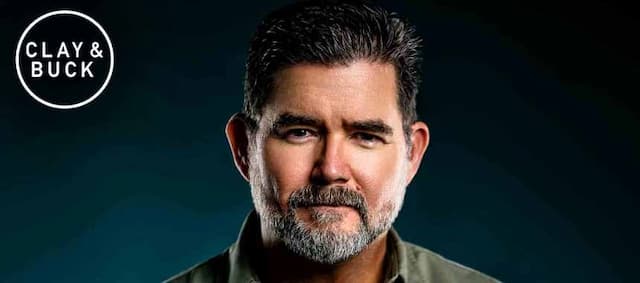How Far Is Putin Willing to Go?
BUCK: A major issue in the background of all this is whether or not this is something that could create, let’s just say, a problem of greater U.S. involvement. Here’s one example, Clay. There’s a lot of refugees — and right now, we’re not really seeing a lot of devastation. We’re starting to see the civilian casualties. The horrors of war will become more apparent, tragically, but that will change the psychology around this in many places. People will start to think, “We cannot allow this.”
You’ll hear a louder drumbeat for U.S. involvement. And one area of this where I get concerned is you see there’s a large refugee flow that’s beginning, what could be a large refugee flow beginning in Ukraine in the northwest corner going into Poland. This could become a thing where we need to set up a safety corridor, and it’ll be NATO allies. Now, I’m not saying it’s gonna happen, but I just trying to point out how mission creep or any…
When you add the humanitarian impulse to do something, it’s gonna get very loud from the media apparatus a lot of people in this country to the possibility of what seems like a more minor escalation from the U.S. and NATO side of things, “Oh, we’re just gonna provide humanitarian relief! Oh, we’re getting close to the border. We’re gonna provide a safe corridor.” You see how… I think the American people are aware of this. There could be not just miscalculation on Putin’s side that could bring other actors into this but on our side, too, given the people who are making the decisions. We could have bleed-over into a conflict that we do not want to take part in. I think that’s what a lot of people are very concerned with right now, understandably so.
 CLAY: Not only that, Buck — and we probably need to talk about this coming up in the next hour — how long is this process gonna play itself out? We have seen before, for instance, when Russia tried to take over Afghanistan. It was a disaster, the insurgency — and the same thing on some level happened with us, but was even worse with Russia. The insurgency in Afghanistan refused to allow itself to be conquered.
CLAY: Not only that, Buck — and we probably need to talk about this coming up in the next hour — how long is this process gonna play itself out? We have seen before, for instance, when Russia tried to take over Afghanistan. It was a disaster, the insurgency — and the same thing on some level happened with us, but was even worse with Russia. The insurgency in Afghanistan refused to allow itself to be conquered.
How long and how aggressively and how violently are the Ukrainian people going to fight to defend their country? And what exactly is the goal of Vladimir Putin? We still don’t know. Is he going to come in and just try to put in a new shadow Russia government in Ukraine that is basically in cahoots with Russia? Or is this a situation where he’s trying to effectively take over Ukraine and make it truly a part of Russia?
And to a larger context, how violent is the resistance? Buck, you mentioned earlier in this hour Russia losing some helicopters. And I was reading from Marco Rubio, who, by the way, has done a really great job of keeping everyone informed based on what he is seeing, and Marco Rubio just an hour and a half ago — tweeted out — a overall analysis of what was taking place, and he says, “Russia’s invasion…”
This was about two hours ago: “Russia’s invasion has already taken longer and been costlier than Putin expected. Almost certain his military and intel leaders knew this ahead of time, but no one dared tell him his expectations were unrealistic.” So how does this play out as we work forward, Buck, in terms of that Ukrainian resistance? Because at some point, theoretically, Russia would say, “This is not worth it or it’s costing too much to us to try to subdue this region.” When would that start to rise up as well? These are big questions in terms of how long this process plays out.
BUCK: Putin’s not gonna be watching the polls, that’s for sure. So there’s a different… Right? There’s a different level of what he can put his country through because right now… I saw this; I wanted to verify it. But there’s a claim that’s going around on Russian state TV that you cannot have gatherings outside because of covid restrictions. I don’t know. It’s tough to see what’s real and what’s not these days in the fog of war, but that would make sense. They’re clearly not gonna allow —
CLAY: Protests.
BUCK: — protests against this inside of Russia, not without the Russian authorities cracking down on them. But beyond that, Putin is one of the richest people in the world. Everyone needs to remember that. This is a guy whose wealth stretches into the tens of billions of dollars. Nobody really knows, because obviously he’s got cash stashed in places and in ways that you can never really be aware of.
 When you’re Putin, also, you could just go to one of your oligarch friends and be like, “I think I need another $5 billion, thanks,” and it will happen unless you want to find yourself in some terrifying Russian dungeon somewhere. So he’s a very rich guy, personally. You’re not gonna get him easily, financially. You’re not gonna get the tier around him. You can prevent them from traveling. That’s one thing. But to your point, Clay, traveling and going in, buying everything and Bergdorf Goodman here in New York City…
When you’re Putin, also, you could just go to one of your oligarch friends and be like, “I think I need another $5 billion, thanks,” and it will happen unless you want to find yourself in some terrifying Russian dungeon somewhere. So he’s a very rich guy, personally. You’re not gonna get him easily, financially. You’re not gonna get the tier around him. You can prevent them from traveling. That’s one thing. But to your point, Clay, traveling and going in, buying everything and Bergdorf Goodman here in New York City…
This is what Russian oligarchs do. What’s the temperature? What does the temperature have to be politically for this to no longer be worth it for Vladimir Putin? That’s a question. Just even a few weeks ago people were saying, “Oh, diplomacy, diplomacy! We feel good about it.” Yeah, now there’s air strikes. Now they’re dropping bombs on the capital city of Ukraine, and you’re seeing, unfortunately, why air superiority is such a major military advantage in twenty-first century battle.
It has been for as long as we’ve had planes but particularly now. So, this is gonna be something we have to evaluate very closely. And how long and how hard will the Ukrainian people fight against this? No one really knows that right now. Seems like they’re fighting pretty hard for the first 24 hours of the conflict, but if it’s just against the regime — and we’ll analyze this in the next hour. What does this look like? There’s the U.S. political angle of this and diplomacy, and then there’s the battle on the ground. What does it look like?
CLAY: There’s also the question that continues to loom out there — and this is always the fear — how much more aggressive is Putin going to be about other lands? Is there the possibility that his goals for reclaiming the homeland of Russia…? We now know, certainly include Ukraine, included Crimea, included parts of other formerly Russian regions. Where else might he look from here? Is he done? Is this the end of his expansionist nature? That’s a monster question that we have grapple with as well.
BREAK TRANSCRIPT
BUCK: Just minutes ago, Clay, the chief correspondent for NBC News, Richard Engel, tweeted out that according to Kremlin press secretary, Dmitry Peskov, Moscow is already willing to negotiate terms of surrender with Kiev. In exchange, Ukraine would have to guarantee neutral status, the promise of no weapons on its territory, and that’s per RT; so I’m assuming that’s Russian state media. This is interesting, because if this really is a massive show of force to get major concessions from the Ukrainian government, this conflict may end. Again, we just don’t know right now. But it could end pretty rapidly if that’s the case. But I thought that was an interesting point here because —
 CLAY: It is fascinating because it goes to what we don’t know, Buck, which is what is Vladimir Putin’s goal here, right? Sometimes, to your point — I think it’s such a good analogy — sitting across the table, you think you’re playing a game of chess and the game of chess not really going on, right? You’re really playing the mental capacities and motivations of Vladimir Putin. And do we even really know even at this point with the invasion underway, we don’t know what he actually wants, which is relatively rare in a situation such as this where an invasion is taking place — certainly in Europe — historically.
CLAY: It is fascinating because it goes to what we don’t know, Buck, which is what is Vladimir Putin’s goal here, right? Sometimes, to your point — I think it’s such a good analogy — sitting across the table, you think you’re playing a game of chess and the game of chess not really going on, right? You’re really playing the mental capacities and motivations of Vladimir Putin. And do we even really know even at this point with the invasion underway, we don’t know what he actually wants, which is relatively rare in a situation such as this where an invasion is taking place — certainly in Europe — historically.
BUCK: As long as they refrain from inflicting large levels of civilian casualties, you could see — and again, trying to think about this from the perspective of the Kremlin, of Putin and the top advisers around him, although I think Putin is his own advisor. I think this is a guy who really is the decider on all these issues. But if you look at this as, “What could he get and how quickly could he get it without having lasting damage to the Russian economy?” it would be if this was a military only… Remember, they’ve been fighting in eastern Ukraine since, what, 2014?
CLAY: That’s right.
BUCK: Thousands and thousands of casualties on the eastern front of Ukraine already barely gets a mention in the Western media. So this is limited to military-against-military strikes, seizing of government buildings — and again, “if” is doing a lot of work in this sentence ’cause we don’t know, then this becomes essentially Putin holding a gun to the head of the Ukrainian government and saying, “Gimme what I want or else,” and he might then think he could walk away. And the international community would have a pretty short memory — not that there is really an international community, but the players involved here would have pretty short memories — of it while gas prices start to really spike. That’s a possibility, one I think we have to take seriously. By the way, that would be a good, relatively speaking.
CLAY: Yes. A good outcome.
BUCK: Relatively speaking, a good outcome would be very short-term conflict that just results in a ceasefire and guarantees that Russia gets its way.





